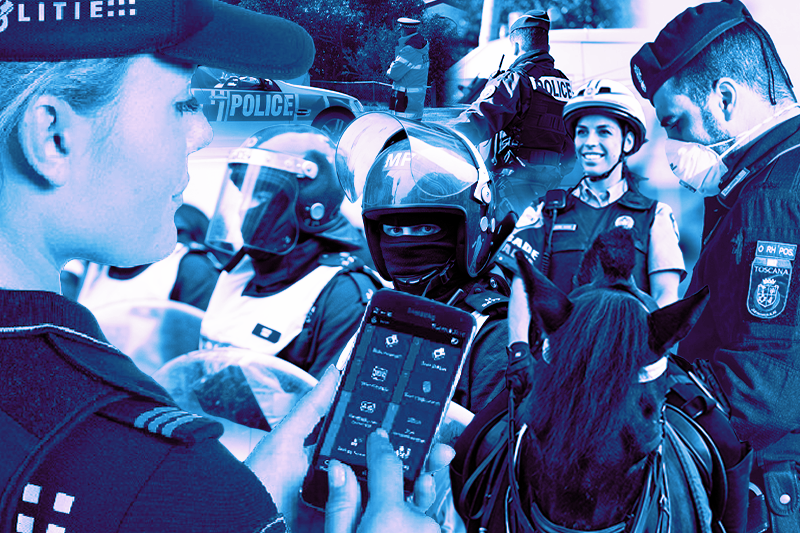Quick links to each team member’s selection
Keith Potter, Editor
Tina Orr Munro, Contributing Editor
Sarah Gibbons, Reporter/Analyst
Andrew Staniforth, Policing Insight regular contributor
Ian Wiggett, Policing Insight regular contributor
Bernard Rix, Publisher of Policing Insight
It has become an annual tradition for the Policing Insight editorial team to reflect on the fantastic content we have had the pleasure and honour to publish over the past year, whether written in-house or by one of our community of expert, influential and often inspiring contributors from policing, criminal justice, the third sector, academia and industry.
It’s an opportunity for us to showcase their contributions once again, and also to thank all of our contributors for sharing their knowledge and wisdom in a challenging year, when it has been needed most.
The team were asked to select 10 articles that most resonated with them in 2020 – an almost impossible task with over 500 quality articles to choose from! We hope you enjoy exploring their choices; these articles are all free to access for the holiday period, and we look forward to delivering more valuable insight in 2021.
All the articles below can be accessed FREE without subscription throughout the Christmas period – you just need to log in to your account or register a free account with your email address.
Keith picks his favourite Policing Insight articles from 2020
 Keith Potter, Editor
Keith Potter, Editor
Keith commissions, edits and writes articles for Policing Insight. He has a 30-year editorial career working as a journalist, sub-editor and editor for a range of print and online platforms. Having worked as a reporter and editor in local newspapers, he has freelanced for the past 20 years, with a particular focus on policing and home affairs. Previous publications and organisations he has worked with in this sector include Police Review, Police Professional, the Police Foundation and the Police Federation; he has also worked for Victim Support, several Higher Education organisations and a number of professional services companies. He has been a contributing writer on Policing Insight since 2017 and took on the role of Editor in August 2020.
As a relatively new member of the Policing Insight team, I was looking forward to picking my Christmas Top 10 articles of 2020, and quietly thinking it should be a straightforward job, as long as I can find 10 I really like. Many hours, several coffees and at least two mince pies later, I’m still trying to whittle down my ‘long list’. This, of course, is testament to the quality of the writers – both those on the team, and the incredible band of talented, experienced and expert contributors – and the wealth of subjects we’ve been able to cover this year.
So the list below is just a few of the many I could have picked, with two caveats. I’ve avoided, as far as possible, our COVID-19 content – my colleagues have been more closely involved in much of this coverage, and I know they will include their favourite pandemic articles. And apologies in advance for those not included – I feel like a list of 50 would still have overlooked some fantastic contributions. I hope you enjoy re-reading these and many other articles on Policing Insight over the festive period.
HMICFRS’ findings point to a police service in need of a radical redesign
In a year understandably dominated by the pandemic, it’s worth remembering that policing, in the UK at least, was facing calls for a major rethink in delivery and approach before COVID-19 arrived. Our publisher Bernard Rix’s commentary in February on the Inspectorate’s report that highlighted “major cracks” in a service already “groaning under the strain” was a reasoned, considered response to some of the media coverage of the report. But anyone who thinks those issues have been dealt with or disappeared would do well to read Police Foundation Director Rick Muir’s November piece from the N8 Policing Research Partnership conference on the need for a “fundamental rethink of the way society is policed”.
Policing must not ‘gloss over’ the Black Lives Matter protests, warns Britain’s first black Chief Constable
I know more than one of my colleagues has picked Sarah’s interview with former Kent Chief Constable Mike Fuller among their Top 10, which highlights how well it captured a message and a moment. They will have their own reasons, but for me two things stood out from this well-crafted piece, as the debate about race and policing raged following the death in the US of George Floyd. Firstly, the interview was partly arranged on the back of Mr Fuller relaunching his autobiography under a new title (A Search For Belonging), because the original one – Kill The Black One First, a cry he faced during the Brixton riots – had inhibited people from reading the book. And secondly, in 2010, as Mr Fuller prepared to move on from Kent, he bemoaned the fact that he was still the UK’s only black chief officer since his appointment in 2004; a further 10 years down the line, that remains unchanged.
The de-fund movement is an opportunity for UK policing, not a threat
As a regular Policing Insight contributor, Owen West could have made this list with a number of articles, including the need to prevent a police siege mentality, and the importance of science in policing public order. However, I’ve chosen this exploration of the ‘defund the police’ debate in July, and the wide range of nuanced arguments which, as one commentator noted, “many will shy away from out of a defensive mindset”, but which Owen believes is an opportunity to “constructively reimagine policing”, while moving away from the “last resort” business.
Mobile data technology: The possibilities for policing are ‘endless’ says Queensland Police Commissioner
With that team of talented writers it seems a touch narcissistic to pick your own work, but this feature makes the list much more for the subject matter than the writing style. While it was a real pleasure to interview Queensland Police Commissioner Katarina Carroll, the Service’s close work with Apple on the QLiTE mobile data system is another example of the technological advances being pioneered through private sector partnerships by Oceanic law enforcement, and joins initiatives such as New Zealand Police’s Lumi drug scan project, Western Australia’s COVID-19 quarantine app and several others that we have featured from that region over the past 12 months.
Senior police officers must be prepared to face the social media spotlight
A number of articles on the site over the past year have highlighted the importance of effective police engagement on social media – Nathan Bird of HootSuite, Tony Alderman (Australian Federal Police) and Dr Liam Ralph, (Northumbria University) all deserve a mention. But for clarity of message and simple, straightforward advice, this feature by Yael Bar-tur, former Director of Social Media for the NYPD, is essential reading. Summed up in one line: “When you opt out, your story will still be told, but by someone else.”
Futures thinking: How can UK policing anticipate and prepare for the threats, challenges and opportunities ahead?
Written by Nic Pole, Principal Analyst at the College of Policing, this thought-provoking article focuses on the College’s Policing in England and Wales: Future Operating Environment 2040 report. While neither the report nor the article were about COVID-19, the challenge of trying to prepare for unknown but imaginable trends and changing scenarios such as a pandemic is very much at the heart of futures thinking, and it’s an issue occupying private and public sector organisations around the world. For an Oceania policing view on the same issue, the recent ‘Future Shock’ article by Katherine Van Gurp, Chief Executive Officer of ANZPAA, is another must-read.
Policing a public health crisis: Exploring knowledge and awareness of drug harm reduction in Scotland
Former Police Scotland Inspector David Macdonald had a 30-year policing career, yet admits to knowing “next to nothing” about drug harm reduction policies at the time he retired – despite Scotland consistently recording the highest level of drug-related deaths in Europe in recent years. This article outlines his research into the issue (also featured in the annual report of the impressive Scottish Institute for Policing Research), and highlights the frustrations of frontline officers trying to deal with a public health emergency that has been running for a lot longer than COVID-19.
How VRUs and a public health approach are making an impact on violent crime
It’s tempting to think that violent crime is firmly on the backburner, but lockdown has simply put it on partial hold. Tina’s article shows how hard police, PCCs and their partners are working through the violence reduction units (VRUs) around the country to tackle an area of crime that has a devastating effect on the often young victims and their families. That impact was acknowledged in the Government’s Serious Violence Bill currently making its way through Parliament, which includes a new legal duty on a multi-agency, public health approach to violent crime – so VRUs are clearly ahead of the game.
Younger in service, less experienced: The dramatic change in the UK’s police service profile over the past five years
Ian Wiggett is a writer capable of real in-depth analysis of complicated issues, and could have made the list with a number of articles this year, including his work on contact management – certain to be a key topic over the next 12 months – and on understanding the changing police workforce mix. But his two-part focus on how ‘early in service’ officers are resigning in much larger numbers, changing the profile of the UK police service at a time when perhaps experience is more important than ever, highlighted a subject that had until then been largely overlooked.
Pandemic leads to ‘challenging’ policing relationship with UK Government, but valuable lessons for the future
Having tried to avoid COVID-19 as much as possible in this list, Sarah’s coverage of National Police Chiefs’ Council Chair Martin Hewitt’s address on the issue to the London Policing College conference deserves to be read. The article succinctly summarises the key challenges and achievements of UK policing to date – although clearly many more of both lie ahead – from a full and honest appraisal of the situation delivered by the officer running the Gold Command response. For those unable to watch the conference, the article provides some real insight; it would be great if at some point in the future the College was able to make that full 40-minute presentation available to a wider audience.
Tina picks her favourite Policing Insight articles from 2020
 Tina Orr Munro, Contributing Editor
Tina Orr Munro, Contributing Editor
Tina is a former Editor of Policing Insight before stepping down to pursue her career as an author. She continues in the role of Contributing Editor at Policing Insight, collaborating on occasional projects. After an initial career as a police scenes of crime officer, Tina retrained as a journalist and began her career on Jane’s Police Review in 2000 as a staff reporter. She became a freelance police and crime journalist in 2004. Since then, Tina has written for the Home Office, the Crown Prosecution Service, the Police Federation of England and Wales, as well as national newspapers and magazines. She has edited the Police Federation’s Police magazine, has had three books published and is now a crime fiction writer.
Well, what a year it has been! This time last year, those in policing circles were beginning to detect some green shoots of recovery from the cuts with the promise of more officers and more investment. Policing Insight’s own publisher, Bernard Rix, talked of how policing could look forward to a more confident 2020 and things got off to a good start.
Report Watch: National Policing Digital Strategy 2020-2030
The Police ICT Company launched the service’s first ever National Policing Digital Strategy at its annual conference in January. Yes, we knew there would be challenges, but on the whole, things were looking up.
Policing the pandemic: Managing the police response to COVID-19 Coronavirus
Then, of course, the global pandemic happened. Suddenly we all found ourselves in a completely new situation. Editorially, there was little information on how to police a global pandemic because it has never happened before in modern times. As a media outlet, we felt the weight of responsibility to produce content that would genuinely inform law enforcement beyond the churn of daily headlines. Professor Karl Roberts, a WHO Health, Security, Law Enforcement and Policing Consultant, filled that void with this superb article, which was avidly read not just in the UK, but across the world, and opened the door to a whole range of brilliant insight from other experts. One impact of COVID-19 has undoubtedly been the increasing realisation that many policing issues are common to all, and for that reason Policing Insight made all its COVID-19 reporting free to access.
Leadership reflections on COVID-19: Staff wellbeing must come first
While outwardly, policing rose to the challenge of tackling an ‘invisible enemy’, behind closed doors there was an understanding of the toll it would take, which made articles such as this, by Lancashire Chief Constable Andy Rhodes, a must-read.
COVID-19 in South Asia: ‘Hard policing’ approach has left police ill-prepared to respond to a pandemic
From March onwards, we ran dozens of in-depth articles on COVID-19. What became increasingly apparent during the lockdown was that our audience went far beyond UK shores, and we began to run many articles sharing the experience of other jurisdictions. This article by Dr Zoha Waseem, a Research Fellow at UCL, shone a light on the impact police policy had on effective policing of a pandemic.
Stalking during lockdown conditions
Policing Insight constantly looks to platform and share insight and vital information to help law enforcement, which is why we were delighted to secure an agreement to run a series of superb articles from UCL on how COVID-19 has impacted different types of crime and criminal activity. This article, by UCL Jill Dando Institute Professors Dr Lisa Tompson and Dr Jyoti Belour, is just one of more than 20 articles that still merit attention for their clarity and systematic approach; possibly the best content series I have seen regarding crime and COVID-19.
Mapped out: How many officers will forces really have in 2023?
Another of my favourite series this year was contributed by CoPaCC Director Ian Wiggett. While the media lauded the arrival of 20,000 extra officers, Ian drilled down and took a closer look at what that means in reality in this article. For me, this in-depth look behind the headlines is Policing Insight at its best.
Out of the darkness: UK policing and the death of George Floyd
Just as policing was beginning to get its head around a pandemic, the murder of a black man by a police officer in broad daylight in the US sparked another huge challenge – and this time policing was at the epicentre. Inevitably, the death of George Floyd shone a light on how the UK polices BAME communities, leading to some difficult conversations. A lot was written, but, for me, Police Foundation Director Rick Muir’s article was among the best and was a perfectly measured piece on the issues including a way forward.
Policing must not ‘gloss over’ the Black Lives Matter protests, warns Britain’s first black Chief Constable
This is a superb interview with former chief constable Mike Fuller by Sarah Gibbons in which he outlines his own experience and the need for policing to listen to the Black Lives Matter protests. Another really important read.
Procedural justice applies to all of policing, not just community police officers
How the police interact with the public is vital for many reasons, not least in maintaining legitimacy. Montel Neufville’s articles often examine aspects of procedural justice, and this piece was a particularly good example.
Disabled Policing Association: Where is disability valued in policing plans
There is an academic conversation to be had around procedural justice, but it occurs to me that it boils down to respecting individuals. That respect has to take place on the street, but also within the police service too, which is why I will finish with an article by Simon Nelson. Simon took over as the President of the Disability Police Association in July. As he says in his article, the pandemic and BLM protests have highlighted many inequalities faced by BAME communities, including BAME police officers, which have quite rightly been much commented on; but now is the time to iron out other inequalities too because, when it comes to being treated equally, no-one should be left behind.
Sarah picks her favourite Policing Insight articles from 2020
 Sarah Gibbons, Reporter/Analyst
Sarah Gibbons, Reporter/Analyst
Sarah has spent much of her journalistic career focusing on police issues. She covered major crime stories and subsequent trials during her time as a reporter with a national news agency before specialising in policing at Police Review magazine and was one of a small team that launched an international version of the title. Sarah was then head-hunted by the Police Superintendents’ Association of England and Wales to be their first Communication Manager. This role included liaising with national and international media, editing a magazine, developing and managing the organisation’s first (and subsequent) website and introducing the Association to social media. For the past nine years, Sarah has worked freelance, writing for a variety of publications, most recently joining the team of Policing Insight writers where she has conducted interviews with influential leaders, covered ground-breaking research and summarised a series of wide-ranging reports to provide a useful insight for our audience on key policing topics.
The police-led app supporting COVID-19 law enforcement in one of the world’s largest jurisdictions
I know this was one of my own articles but it summed up the pleasure I have writing for this organisation – great subject matter, interesting and forthcoming positive leaders to interview (Oh, and such a great solution to dealing with the worldwide pandemic too!).
Futures thinking is forward planning: ‘This isn’t a fad – it has to be embedded’
A well-written piece summing up the tensions between policing comfort zones and innovation.
Policing the Pandemic: Six-wave panel study highlights the importance of legitimacy and public interactions
Reflections on the pandemic during the pandemic proving just how fast-moving this whole situation is and how quickly lessons are being learned.
The aching blue: Trauma, stress and the invisible wounds of those in law enforcement
A powerful description of some of the harsh realities of policing, the long-lasting effects they can have and an offer of help. ‘We can fix this’ is a great note to end on.
It’s a dog’s life: The success of the canine digital device detection team
As a writer who operates as ‘The Little Newshound,’ I had to choose this one! A great subject and sure to become much more widespread. Definitely another area where dogs are more talented than people!
Individuality and belonging: The impact of language and categorisation
Thought-provoking piece about the impact of labels on individuals and associated views. Important read for all, not just a policing issue.
Senior police officers must be prepared to face the social media spotlight
Hugely topical subject – I’ve had experience trying to introduce cynical officers to social media, something seriously outside their comfort zone yet highly beneficial to their communication strategy.
Sharjah’s children’s house could be an inspirational model for the Middle East
Such a simple model to help victims of such horrific crimes. Good to see true international good practice in action.
The transformation of policing in Northern Ireland may hold lessons for the United States
Two fascinating and hugely influential countries in terms of policing and security with the eyes of the rest of the world constantly scrutinising every incident.
Then and now: The evolution of Canada’s decentralised, coordinated and multiple agency approach to policing
An interesting mix of history and culture and how policing has evolved in such a diverse country as Canada.
Andy picks his favourite Policing Insight articles from 2020
 Andrew Staniforth, Policing Insight regular contributor
Andrew Staniforth, Policing Insight regular contributor
Andrew Staniforth is Director of Research and Innovation at Saher (Europe), a security research, training and consultancy operating at a global level, supporting police forces and private sector organisations to identify and implement innovative security technologies to maximise impact. As a founding Board Member and Senior Research Fellow at the Centre of Excellence in Terrorism, Resilience, Intelligence & Organised Crime Research (CENTRIC), he is the author and editor of numerous books addressing international policing issues. As a former Special Branch Intelligence Officer and counter-terrorism detective, he has worked across the world and supported missions of the United Nations Terrorism Prevention Branch.
How effective are current UK sentencing measures for terrorists?
The interview with Emeritus Professor Clive Walker, the Senior Special Advisor to the UK’s Independent Reviewer of Terrorism legislation, highlighted the acute challenges confronted by prosecutors, probation officers and police in keeping the public safe from convicted terrorists who despite being released from prison, remain a severe threat to public safety and the UK’s free and democratic way of life.
With one in five officers expected to suffer from PTSD, mandatory mental health support is crucial
This article illustrated the pressures of policing modern Britain, and the devastating impact upon the mental health of police officers. The warnings in this article must be noted by senior officers and the need to provide mandatory mental health support should now be a fundamental duty of care requirement for ALL police officers and staff.
From poppies to meth: How Afghanistan is changing the global drug-trafficking landscape for good
The global pandemic did little to prevent transnational crime organisations from extending their empires. Drug trafficking throughout the world overcame government and border control lockdowns and restrictions brought about by COVID-19, which was clearly demonstrated in this article focusing upon the changing drug trafficking landscape in Afghanistan.
Hack Hate: Tech specialists, students, problems solvers and police join forces to fight hate crime
This article illustrated the growing collaborative partnerships between government, academia and the private sector to tackle online hate crime. It remains disappointing that such partnerships are required to tackle a threat that continues to grow in the darkest and deepest corners of the web, and which brings misery to many of the most vulnerable in our society, but which provides financial reward for tech investors, shareholders and venture capitalists of social media platforms. Will the UK’s new Online Harm Bill make a difference in 2021?
Online surveillance must increase to contain the spread of online extremism
Despite new partnerships, investigative measures, additional resource and the progress of new laws, young and vulnerable members across UK communities continue to be radicalised and recruited to violent causes online. For almost two decades the police have had to track and trace cyber terrorists whose infiltration of the internet has not been properly addressed. This article explores why online surveillance must now be amplified to contain the terror threat.
Final countdown: Brexit is about to change UK data protection law forever, but are forces ready?
This article from early 2020 articulates the challenge of Brexit uncertainty to UK data protection law. It provides a stark warning to police forces and as we now depart the EU, time will tell which police forces are prepared to manage the data they hold beyond Brexit.
Rules of engagement: Durham PCC uses technology that helped put Obama in the White House to understand local issue
Published prior to the first national pandemic lockdown this article provided a positive insight to the innovations of one PCC, using technology to understand local issues. It would of course be fascinating to know how this new technology helped the Durham PCC and the Durham Constabulary to effectively respond to the COVID-19 crisis at the most local level. How did it help? Was this learning shared across the UK policing landscape? A follow-up article would be most welcome.
Operation Venetic was a big NCA victory – but are the cartels winning the war?
The success of the National Crime Agency’s Operation Venetic was a tremendous achievement and a real positive policing story for 2020. But beyond the initial arrests and drug seizures, the operation exposed the global illicit drug trade and the colossal task facing all international crime investigators in bringing cartel kings to justice.
INTERPOL: Innovation in policing is key to keeping communities safe
Throughout 2020 the rise in the awareness of INTERPOL was notable, announcing new innovation centres, best practice guidance and publishing operational support advice of real value to policing across the world on a diverse range of topics. Most interesting however was the growing emphases and expertise placed upon the value of innovating, especially within community policing, which remains at the heart of successful police service delivery across the world.
Manifesto of terror: The rise of far-right extremism
The interview with Dr Rakib Eshan of the Henry Jackson Society provided a unique insight to the rise of extreme right-wing terrorism in the UK which, during 2020, has given rise to further attacks across Europe. The rise of far-right terrorism and white supremacist ideology remains a severe threat to UK national security and this interview provides an accurate explanation of the beliefs and motivations of those that seek to divide communities.
Ian picks his favourite Policing Insight articles from 2020
 Ian Wiggett, Policing Insight regular contributor
Ian Wiggett, Policing Insight regular contributor
Ian Wiggett is a CoPaCC Director and a former ACC in Greater Manchester Police, with responsibility for Serious Crime and Counter Terrorism. He was the national lead for systems thinking and for casualty bureau, and was chair of the NPAS Assurance Group. Ian previously had responsibility for specialist operations within GMP. He has led work in GMP to improve responses to missing persons and mental health, and in applying systems thinking approaches across local and specialist policing. Ian began his service in the Metropolitan Police, and gained extensive experience of public order and crime investigation. After being head of CID in three London divisions, he headed the Intelligence and Performance portfolio within Territorial Policing. Following transfer to Cheshire Constabulary, he became Director of Intelligence, held commands in local policing and specialist operations, and led several forcewide change programmes.
Two themes dominated policing in 2020: the Covid pandemic, and Black Lives Matter. Policing was a political punch bag, having to thread a way through all this, enforcing difficult rules in difficult situations, and trying to maintain a balance between polarised groups. Yet there has also been tremendous strength, and continued dedication and innovation from a police family that has risen to the challenge. Policing also has to carry on dealing with all the usual issues as well. My Top 10 for this year tries to capture this, and hopefully will prompt some reflection on what it means for the coming years.
Maintaining a culture of common good: Police, community and leadership during the COVID-19 crisis
Dr Emma William’s reflections on a WeCops debate. I am a fan of WeCops. It’s an open forum for those inside and outside policing, at all levels, to discuss issues. One officer tweeted: “When all this is over we all need to ask ourselves what did we do before and analyse why it was important. It is time to reset expectations, commitments and heaven forbid avoid another target culture. This could be our finest hour.”
Coronavirus: Why we must tackle hard questions about police power
As rules and the enforcement of them began to reach into everyone’s lives, police officers had to learn quickly how to apply the law in new sets of circumstances. There was, however, a body of knowledge to help make sense of the underlying challenges.
Policing the lockdown: Compliance, enforcement and procedural justice
Written mid-year, this gave space for reflection on the policing of lockdown, as well as a forward look. As lockdown still continues, has policing now found the right balance? Are public objections still about the policing? Or are they now about the restrictions themselves?
Out of the darkness: UK policing and the death of George Floyd
“Good policing is about treating every citizen fairly and with respect, what gets called ‘procedural justice’ in the academic literature.” The protests and, sadly, violence across the world that followed George Floyd’s death put policing at the centre of wider politics, putting a potential spotlight on every operational decision. Good policing is not just about enforcing the law.
Policing must not ‘gloss over’ the Black Lives Matter protests, warns Britain’s first black Chief Constable
Big political arguments may dominate the media, but behind the noise are real experiences and basic humanity.
Extraordinary people. Extraordinary job. Extraordinary times.
John Sutherland has an extraordinary talent to capture the moment and remind everyone of good sense and decency. “For every negative story occupying the news pages, I could tell you a hundred extraordinary ones – about the extraordinary people who do this extraordinary job. One of my old bosses had it right: they are the everyday heroes and heroines who police our streets. And theirs are the stories that demand to be told.”
Best case scenario: What a post-pandemic future could look like for policing
I love that there is a Director of Strategic Foresight in the Australia New Zealand Policing Advisory Agency. Two countries coming together to allocate a little time to common challenges. How much space do other police services give to thinking about what’s coming next?
Big data: A powerful tool for policing, providing the right controls and balances are in place
I’m a fan of using knowledge too, and excited by the growing opportunity to gain insights from data. Is the service really making best use of the information it has?
The Policía de Investigaciones de Chile: How ‘investigating for the citizen’ made the PDI a trusted Chilean institution
Policing Insight brought some great articles this year from across the globe. I could have selected any of them! This article shows that challenges are often common to us all, but a different structure allows for different responses and suggests potential solutions that can be applied in other jurisdictions.
Police mental health and wellbeing: Are your officers equipped to have difficult conversations?
Finally, alongside the operational challenges, police forces in England and Wales are seeing a major shift in the workforce profile, bringing huge pressure on frontline supervisors. “Across the country there are thousands of sergeants, new in rank and young in service, who are the focus of pressure and expectation from both senior management and those they lead – and let’s not forget the unfair and unrealistic pressure and expectation they will undoubtably place on themselves.”
Bernard picks his favourite Policing Insight articles from 2020
 Bernard Rix, Publisher of Policing Insight and Founder of the World Class Policing Awards
Bernard Rix, Publisher of Policing Insight and Founder of the World Class Policing Awards
Prior to setting up Policing Insight’s parent company, CoPaCC Ltd, in 2012, Bernard worked for more than 20 years as an independent police, criminal justice and community safety advisor across the UK, Europe and the Middle East. He led over 50 significant change assignments in this time, work that has – among other benefits – improved police investigation of burglary, cut court delays, given victims a better service, helped community relations, and enhanced police officer safety. He established Policing Insight in 2015, and the World Class Policing Awards in 2019.
EXCLUSIVE: INTERPOL warns criminals are now targeting life-saving medical hardware
Our former Editor (and now Contributing Editor) Tina Orr Munro interviewed INTERPOL’s Executive Director, Stephen Kavanagh, about his organisation’s assessment of the global crime trends emerging from the COVID-19 pandemic, and how they were working with law enforcement agencies around the world to target offenders – an example of international cooperation and collaboration at its best.
COVID-19: Policing the new normality
One of the first articles we published on COVID-19 and policing, by our colleague Ian Wiggett. Far-sighted and influential, it set the standard for much of our pandemic coverage that was to follow.
A force for the future: How hi-tech, happiness and international cooperation are all key to the success of Dubai Police
Our Editor, Keith Potter, spoke to Dubai Police Commander-in-Chief, Lieutenant General Abdullah Khalifa Al Marri, about the approaches and initiatives adopted by the force – the first law enforcement agency to win seven awards from the International Association of Chiefs of Police in a single year.
Leadership reflections on Covid-19: Staff wellbeing must come first
Lancashire Constabulary’s Chief Constable Andy Rhodes, the National Police Chiefs’ Council lead for wellbeing and staff engagement, provided his thoughts on the potential organisational impact of COVID-19 very early in the pandemic’s life.
The Policía de Investigaciones de Chile: How ‘investigating for the citizen’ made the PDI a trusted Chilean institution
In our first ever interview with a South American police leader, PDI Director General Héctor Espinosa talked to Policing Insight about the work of the force and the steps it has taken to become one of the country’s must trusted and reliable institutions.
Breaking new ground on diversity: New South Wales Police strategy promises to ‘go beyond the traditional principles’
Tina Orr Munro spoke to NSW Police Assistant Commissioner Leanne McCusker about the force’s inclusion and diversity strategy, gaining an Australian insight into an issue that affects policing around the world.
Stronger together: How the private sector can help the police during the pandemic
Illustrating that Policing Insight’s editorial content originates not only from policing and academia but also from the private sector, this article from Chorus Intelligence CEO Boyd Mulvey explores how commercial organisations can better support the service to meet existing and emerging challenges.
Policing the pandemic: Managing the police response to COVID-19 Coronavirus
Pretty much our first ‘Policing and COVID-19’ article, this was written by Professor Karl Roberts, who advises the World Health Organisation on health security, law enforcement and policing. Karl now also is a member of Policing Insight’s International Advisory Board.
Best case scenario: What a post-pandemic future could look like for policing
Mike Richmond, Assistant Director of Strategic Foresight at the Australia New Zealand Policing Advisory Agency (ANZPAA), provided Policing Insight with an article that attracted a great deal of interest and engagement globally, helping establish new cross-border relationships between policing leaders and advisors.
‘When the looting starts, the shooting starts’: Time for policing globally to find its voice
Am I allowed to include one I wrote myself?! If yes, then this was one of my 2020 articles that had the greatest impact. I wrote it over a weekend when there was a strong feeling that the unrest in the United States over Black Lives Matters would take a firm grip globally. Not only did the article attract supportive public comment, several senior police officers contacted me privately to suggest it had a very positive impact on police leader thinking.
Do you agree with the team? Why not let us know your favourite article in the comments below with a link and a few words about why you selected the article?


